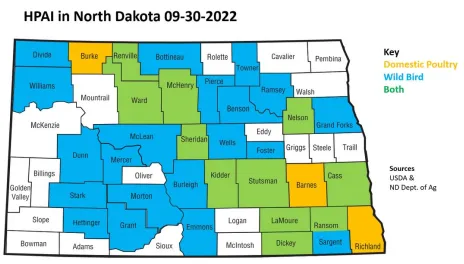Biosecurity the best line of defense against highly pathogenic avian influenza (HPAI)
Avian influenza is caused by influenza Type A virus (influenza A). Avian influenza viruses are classified as either “low pathogenic” or “highly pathogenic” based on their genetic features and the severity of the disease they cause in poultry. The first confirmed case of HPAI in 2022 in North Dakota was in a wild snow goose on March 24 followed by a backyard flock on March 29.
Instances of HPAI decreased during the summer months, but with the fall migration beginning a resurgence has occurred. You can find information on the current cases of HPAI in North Dakota as well as the poultry/bird event restrictions map on the North Dakota Department of Agriculture website: https://www.nd.gov/ndda/hpai.
NDSU Extension specialists have developed tips for reducing transmission of HPAI.
To reduce transmission between wild and domestic birds:
- If possible, keep poultry housed until the risk for transmission has decreased. Non-lethal methods to deter wild birds are available on the USDA wildlife damage webpage: www.aphis.usda.gov/aphis/ourfocus/wildlifedamage/sa_reports/ct_wildlife+damage+management+technical+series.
- Reduce the attractiveness for wild birds to stop at your place by cleaning up litter and spilled feed around your domestic poultry housing.
- If you come in contact with or handle wild birds, change into clean clothes, wash your hands and disinfect your footwear prior to contact with domestic birds.
- Report sick or deceased wild birds to the North Dakota Game and Fish Department at https://gf.nd.gov/wildlife/diseases/mortality-report. Report sick domestic birds to your local veterinarian or the North Dakota State Board of Animal Health at 701-328-2655.
- In the event you need to handle or dispose of carcasses to reduce potential interactions, be sure to follow the appropriate procedures: www.ndsu.edu/agriculture/ag-hub/highly-pathogenic-avian-influenza.
To reduce transmission between domestic flocks:
- Keep your distance. Restrict access to your property and your birds. Allow contact from people who care for your birds but minimize visitors.
- Do not haul disease home. If you have been near other poultry or poultry owners, such as at feed stores, clean and disinfect car and truck tires. New birds should be kept separate from your flock for at least 30 days.
- Do not borrow disease from your neighbor. Do not share lawn and garden equipment, tools or poultry supplies with your neighbor or other poultry owners.
As a reminder, HPAI is not a food safety concern for consumers. Poultry testing positive for HPAI are prohibited by law from entering the marketplace.
If you’re an avid bird hunter, check out the recent press release “NDSU Extension offers guidance on handling HPAI-suspected wild birds during hunting season” to learn more about what steps to take if they see sick or deceased wild birds.
To learn more about how NDSU Extension responded to the 2022 spring HPAI outbreak, see pages 17-18 of the North Dakota Livestock Research Report.
Mary Keena
Mary.Keena@ndsu.edu
NDSU Extension livestock environmental management specialist
Miranda Meehan
Miranda.Meehan@ndsu.edu
NDSU Extension livestock environmental stewardship specialist
Gerald Stokka, DVM
Gerald.Stokka@ndsuedu
NDSU Extension veterinarian and livestock stewardship specialist

